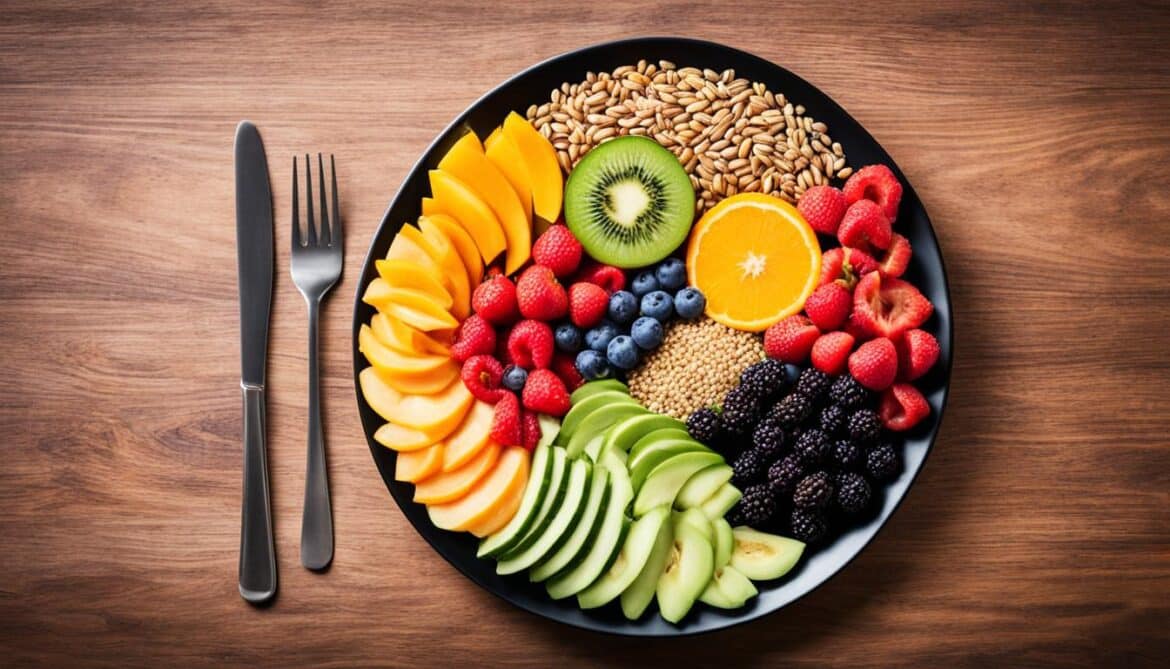Plant-based meal plans offer a compassionate and effective approach to weight loss. By focusing on whole foods derived from plants, these meal plans provide a wealth of nutrients while reducing the consumption of animal products and processed foods. Studies have shown that following a plant-based diet can lead to weight loss, improved heart health, and reduced risk of chronic diseases such as diabetes and obesity. With the growing popularity of plant-based eating, many people are turning to plant-based meal plans as a sustainable and ethical way to reach their weight loss goals.
Key Takeaways:
- Plant-based meal plans prioritize whole foods derived from plants.
- Following a plant-based diet can lead to weight loss and improved heart health.
- Plant-based meal plans reduce the consumption of animal products and processed foods.
- Many people are adopting plant-based meal plans for sustainable and ethical weight loss.
- Plant-based eating can help reduce the risk of chronic diseases like diabetes and obesity.
Benefits of Plant-Based Meal Plans for Weight Loss
Plant-based meal plans offer numerous benefits for weight loss. Firstly, they tend to be lower in calorie density compared to diets that include meat and dairy products, allowing individuals to consume larger quantities of food for fewer calories. This can lead to increased satiety and a reduced intake of high-calorie foods.
Secondly, plant-based meal plans are typically rich in dietary fiber, which promotes feelings of fullness and helps regulate appetite. Fiber also aids in digestion and prevents constipation. By including a variety of fruits, vegetables, whole grains, legumes, nuts, and seeds in their diet, individuals can ensure an ample intake of fiber.
Furthermore, plant-based meal plans are abundant in vitamins, minerals, and antioxidants, providing the body with essential nutrients needed for optimal health. Vitamins and minerals play important roles in supporting the immune system, energy production, and overall well-being. Antioxidants help protect the body against oxidative stress and cellular damage.
Lastly, plant-based eating is often associated with improved insulin sensitivity, which can aid in weight loss and the prevention of type 2 diabetes. By reducing the consumption of refined carbohydrates and animal products, individuals can better regulate their blood sugar levels and maintain a healthy weight.
In summary, the benefits of plant-based meal plans for weight loss include lower calorie density, increased satiety, regulated appetite, ample intake of fiber, essential nutrients, and improved insulin sensitivity. By adopting a plant-based approach, individuals can embrace a sustainable and compassionate way of eating while achieving their weight loss goals.
Components of a Plant-Based Meal Plan for Weight Loss
A well-designed plant-based meal plan for weight loss incorporates a variety of nutrient-dense foods while minimizing or eliminating animal products and highly processed foods. The key components of a plant-based meal plan include:
- Fruits and Vegetables: Incorporate a wide array of colorful fruits and vegetables into your meals. These are rich in fiber, vitamins, minerals, and antioxidants, providing essential nutrients for weight loss and overall health.
- Whole Grains: Choose whole grains such as quinoa, brown rice, and oats over refined grains. These offer more fiber and nutrients, promoting satiety and steady energy levels.
- Legumes: Include legumes like lentils, chickpeas, and black beans in your plant-based meals. They are excellent sources of plant-based protein, fiber, and carbohydrates, keeping you fuller for longer.
- Nuts and Seeds: Incorporate a variety of nuts and seeds such as almonds, walnuts, chia seeds, and flaxseeds into your meal plan. These provide healthy fats, protein, and fiber, contributing to fullness and supporting bodily functions.
- Healthy Fats: Include sources of healthy fats like avocado, olive oil, and coconut oil in moderation. These fats add flavor, promote satiety, and support nutrient absorption.
- Herbs and Spices: Enhance the flavor profile of your plant-based meals with a range of herbs and spices. They can make your meals more enjoyable and satisfying.
“A well-designed plant-based meal plan for weight loss emphasizes whole, nutrient-dense foods while minimizing or eliminating animal products and highly processed foods.”
Portion control is also important when following a plant-based meal plan for weight loss. It ensures that individuals are staying within their calorie goals and maintaining a balanced intake of nutrients.
By combining these components in a well-balanced and thoughtful manner, a plant-based meal plan can provide the necessary nutrients for weight loss while promoting overall health and well-being.
Sample Plant-Based Meal Plan
Here is an example of a simple one-day plant-based meal plan for weight loss:
| Meal | Menu |
|---|---|
| Breakfast | Avocado toast with whole grain bread, topped with cherry tomatoes and a sprinkle of chia seeds |
| Lunch | Quinoa salad with mixed vegetables (such as bell peppers, cucumbers, and carrots), chickpeas, and a drizzle of olive oil and lemon dressing |
| Snack | A handful of mixed nuts and a piece of fresh fruit |
| Dinner | Lentil curry with brown rice and a side of steamed broccoli |
| Snack | Carrot sticks with hummus |
Disclaimer: This is just a sample meal plan and may not suit everyone’s individual dietary needs. It’s always best to consult with a healthcare professional or registered dietitian for personalized recommendations.
Tips for Success with Plant-Based Meal Plans for Weight Loss
When it comes to achieving success with plant-based meal plans for weight loss, a few key strategies can make all the difference. Here are some tips to help you on your journey:
- Plan and Prepare Meals in Advance: To stay on track with your plant-based meal plan, it’s important to plan and prepare your meals in advance. This can involve batch cooking, creating a weekly meal schedule, and stocking up on pantry essentials. By having healthy options readily available, you can make better choices and avoid falling into old habits.
- Incorporate a Wide Variety of Plant-Based Foods: To ensure you’re getting a diverse range of nutrients and to keep your taste buds excited, incorporate a wide variety of plant-based foods into your meal plan. Experiment with different fruits, vegetables, whole grains, legumes, nuts, and seeds. This not only provides you with essential nutrients but also helps maintain interest and enjoyment in your diet.
- Stay Hydrated: Hydration plays a crucial role in weight loss and overall health. Make sure to drink plenty of water throughout the day to stay hydrated. Water helps to cleanse your body, keep your digestion regular, and prevent overeating. Aim to drink at least 8 glasses of water daily to support your weight loss efforts.
- Stay Physically Active: Incorporating regular exercise into your routine can have a significant impact on your weight loss journey. Engaging in activities you enjoy, such as walking, jogging, cycling, or dancing, can help burn calories, improve cardiovascular health, and boost your metabolism. Aim for at least 30 minutes of moderate-intensity exercise most days of the week.
- Seek Professional Guidance: If you’re new to plant-based eating or want personalized advice, seek support from a registered dietitian or nutritionist who specializes in plant-based eating. They can provide valuable guidance tailored to your specific needs, help you plan balanced meals, and ensure you’re meeting all your nutritional requirements.
“Success with plant-based meal plans for weight loss comes down to proper planning, variety, hydration, physical activity, and professional guidance. These strategies will not only help you shed pounds but also ensure a healthy, balanced transition to a plant-based lifestyle.”
Plant-Based Meal Plan Examples for Weight Loss
Looking for some inspiration for your plant-based weight loss journey? Here are two sample meal plans that showcase the variety and flexibility of plant-based eating:
Meal Plan 1: Veggie Delight
Start your day with a nutritious breakfast packed with fiber and protein:
- 1 cup of oatmeal topped with berries and a sprinkle of chia seeds
- A side of sautéed spinach with garlic
- 1 cup of plant-based milk
- A green tea or herbal tea
For lunch, enjoy a satisfying and flavorful salad:
- A generous portion of mixed greens
- Roasted chickpeas for added crunch and protein
- Sliced cucumbers, cherry tomatoes, and grated carrots
- A drizzle of balsamic vinaigrette
For dinner, indulge in a delicious plant-based stir-fry:
- A mix of colorful vegetables such as bell peppers, broccoli, and mushrooms
- Tofu or tempeh as a protein source
- Serve over a bed of quinoa or brown rice
- Garnish with fresh herbs like cilantro or basil
Snack options:
- A small handful of almonds or walnuts
- Sliced apple with peanut butter
- Celery sticks with hummus
Remember to stay hydrated throughout the day by drinking plenty of water. If needed, you can adjust portion sizes based on your individual needs and goals.
Meal Plan 2: Mediterranean Bliss
Experience the flavors of the Mediterranean with this plant-based meal plan:
Start your day with a light and refreshing breakfast:
- A slice of whole grain bread topped with avocado, sliced tomatoes, and a sprinkle of sea salt
- A side of fresh fruit, such as melons or berries
- A cup of herbal tea
For lunch, enjoy a hearty salad inspired by the flavors of Greece:
- A bed of romaine lettuce
- Diced cucumbers, cherry tomatoes, and Kalamata olives
- Cubed tofu or cooked chickpeas for protein
- A drizzle of olive oil and a squeeze of lemon juice
For dinner, savor a plant-based twist on the classic Italian dish, pasta:
- Whole wheat spaghetti or spiralized zucchini noodles
- A flavorful sauce made with tomatoes, garlic, and a sprinkle of nutritional yeast for a vegan Parmesan taste
- Add sautéed vegetables like bell peppers, mushrooms, and spinach
Snack options:
- A handful of raw almonds or pistachios
- Carrot and celery sticks with hummus
- A piece of dark chocolate
Feel free to customize these meal plans to suit your taste preferences. With plant-based eating, the possibilities are endless! Remember to focus on whole, nutrient-dense foods and listen to your body’s hunger and fullness cues.
Frequently Asked Questions about Plant-Based Meal Plans and Weight Loss
As plant-based meal plans gain popularity as a compassionate and effective approach to weight loss, many questions may arise. Here are some frequently asked questions about plant-based meal plans and weight loss:
1. Are plant-based meal plans suitable for weight loss?
Yes, plant-based meal plans can be highly effective for weight loss. By focusing on whole foods derived from plants, these meal plans provide nutrient-rich, low-calorie options that support weight management.
2. Can a plant-based diet provide all the necessary nutrients for weight loss?
A well-planned plant-based meal plan can provide all the necessary nutrients for weight loss. It is important to ensure a varied intake of fruits, vegetables, whole grains, legumes, nuts, and seeds to meet nutritional needs.
3. Will I still feel satisfied on a plant-based meal plan for weight loss?
Absolutely! Plant-based meal plans are often high in fiber, which promotes feelings of fullness and satiety. Additionally, incorporating a variety of flavors and textures in your meals can enhance satisfaction.
4. Are plant-based meal plans suitable for athletes or those with high protein needs?
Yes, plant-based meal plans can meet the protein needs of athletes and individuals with high protein requirements. Foods such as legumes, tofu, tempeh, seitan, and plant-based protein powders can be incorporated to ensure an adequate protein intake.
5. Can I still enjoy desserts and snacks on a plant-based meal plan?
Absolutely! There are plenty of plant-based dessert and snack options available. Fruits, nuts, seeds, dark chocolate, and homemade treats can be enjoyed while fitting into a plant-based meal plan for weight loss.
6. How quickly can I expect to see weight loss results on a plant-based meal plan?
Weight loss results can vary depending on various factors such as individual metabolism, activity level, and adherence to the meal plan. However, many individuals experience noticeable weight loss within a few weeks of starting a plant-based meal plan.
7. Can plant-based meal plans be sustainable in the long term?
Absolutely! Plant-based meal plans can be sustainable in the long term, especially when approached as a lifestyle rather than a short-term diet. With proper planning, variety, and education, individuals can continue to enjoy the benefits of plant-based eating for weight loss and overall health.
| Question | Answer |
|---|---|
| 1. Are plant-based meal plans suitable for weight loss? | Yes, plant-based meal plans can be highly effective for weight loss. |
| 2. Can a plant-based diet provide all the necessary nutrients for weight loss? | A well-planned plant-based meal plan can provide all the necessary nutrients for weight loss. |
| 3. Will I still feel satisfied on a plant-based meal plan for weight loss? | Absolutely! Plant-based meal plans are often high in fiber, which promotes feelings of fullness and satiety. |
| 4. Are plant-based meal plans suitable for athletes or those with high protein needs? | Yes, plant-based meal plans can meet the protein needs of athletes and individuals with high protein requirements. |
| 5. Can I still enjoy desserts and snacks on a plant-based meal plan? | Absolutely! There are plenty of plant-based dessert and snack options available. |
| 6. How quickly can I expect to see weight loss results on a plant-based meal plan? | Weight loss results can vary depending on various factors such as individual metabolism and adherence to the meal plan. |
| 7. Can plant-based meal plans be sustainable in the long term? | Absolutely! Plant-based meal plans can be sustainable in the long term, especially when approached as a lifestyle. |
Conclusion
In conclusion, plant-based meal plans offer a compassionate and effective approach to weight loss. By focusing on whole, plant-derived foods and minimizing animal products and processed foods, individuals can achieve their weight loss goals while enjoying a wide variety of nutritious and delicious meals.
Plant-based meal plans have been shown to offer numerous benefits, including improved heart health, reduced risk of chronic diseases, and increased satiety. By following the tips for success and incorporating plant-based meal plan examples, individuals can embark on a journey of health and compassion while achieving their weight loss goals.
So, whether you’re looking to shed a few pounds or transition to a more sustainable and ethical way of eating, plant-based meal plans provide a holistic approach that promotes both weight loss and overall well-being. Start incorporating plant-based meals into your diet today and experience the transformative power of a compassionate approach to weight loss.
FAQ
How can plant-based meal plans help with weight loss?
Plant-based meal plans can help with weight loss by focusing on whole foods derived from plants, which are typically lower in calorie density compared to diets that include meat and dairy products. Additionally, plant-based meal plans are rich in dietary fiber, which promotes feelings of fullness and helps regulate appetite. They also provide essential nutrients and support overall health and well-being.
What should a well-designed plant-based meal plan for weight loss include?
A well-designed plant-based meal plan for weight loss should emphasize whole, nutrient-dense foods such as fruits, vegetables, whole grains, legumes, nuts, and seeds. It should minimize or eliminate animal products and highly processed foods. It should also include healthy fats and incorporate a range of spices and herbs for flavor. Portion control is important to meet calorie goals.
How can I achieve success with a plant-based meal plan for weight loss?
To achieve success with a plant-based meal plan for weight loss, it is important to plan and prepare meals in advance. Batch cooking, creating a weekly meal schedule, and stocking up on pantry essentials can help. Incorporating a wide variety of plant-based foods ensures a diverse nutrient intake. Staying hydrated, staying physically active, and seeking guidance from a registered dietitian or nutritionist can also contribute to success.
Are there any plant-based meal plan examples available for weight loss?
Yes, there are many plant-based meal plan examples available for weight loss. These examples provide a sense of the variety and flexibility of plant-based eating. They include a variety of fruits, vegetables, whole grains, legumes, nuts, and seeds, and can be customized to individual preferences and dietary needs.
How can plant-based meal plans benefit heart health and reduce the risk of chronic diseases?
Plant-based meal plans have been shown to improve heart health and reduce the risk of chronic diseases such as diabetes and obesity. They are typically lower in saturated fat and cholesterol compared to diets that include animal products. They are also rich in dietary fiber, vitamins, minerals, and antioxidants, which support cardiovascular health and overall well-being.



